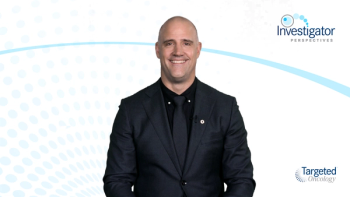
Thyroid Cancer Treatment Guidelines
Andrew Gianoukakis, MD, reviews the NCCN guidelines for the treatment of patients with thyroid cancer.
Episodes in this series

Lori Wirth, MD: Let’s go through the NCCN [National Comprehensive Cancer Network] guidelines quickly.
Andrew Gianoukakis, MD: These are the NCCN guidelines, 2020. Systemic therapy is considered for patients with progressive and/or symptomatic disease. Lenvatinib is preferred, but lenvatinib or sorafenib is used as first-line therapy. NTRK inhibitors, such as larotrectinib or entrectinib, are used for the small percentage of patients with an NTRK fusion. Selpercatinib or pralsetinib are used for patients with RET fusion-positive tumors, which is again the minority of patients. For pembrolizumab, although not proven terribly effective as a monotherapy, the NCCN guidelines suggest for a high tumor mutational burden PTC [papillary thyroid carcinoma] that pembrolizumab can be considered. In addition, we should always be on the lookout for the potential of clinical trials being something that would be appropriate for our patients. Importantly, these systemic therapies should be administered when the disease is systemic. We most definitely would like to treat disease that’s of limited spread, so individual localized disease, with either surgery or EBRT [external beam radiation therapy], as noted on the slide. Similarly, disease monitoring, as was mentioned for this case, may be appropriate in asymptomatic patients with indolent disease, assuming there are no brain metastases.
Lori Wirth, MD: I think we’ve talked a lot about when to start systemic therapy. The NCCN guidelines say progressive or symptomatic disease. One thing that I think is important is, you don’t want to wait until patients have symptomatic disease before starting. That will impact on their performance status, and we know that patients in whom lenvatinib is started when the performance status is 1 vs 0 don’t do as well and don’t have as good responses that last as long as they do when you start a little bit earlier, before patients have symptomatic disease. If a patient shows up in your office with symptomatic disease, then of course you absolutely do want to start a drug like lenvatinib, but you don’t want to wait until they have symptomatic disease. We’ve been talking about starting lenvatinib, and we’ve also talked a little bit about if there is an NTRK fusion or a RET fusion. But if there aren’t those actionable fusions when you do start therapy, which therapy do you use? Marcia, you already said lenvatinib is in general your first-line go-to drug. Andrew, how about you?
Andrew Gianoukakis, MD: I agree. Lenvatinib, as Marcia noted, is the most efficacious drug, and I reach for lenvatinib first also.
Lori Wirth, MD: Let’s talk a little bit more about the lung metastases. Andrew, you mentioned the anatomical consideration, if something is about to cause airway obstruction. Apart from those, just with the lung nodules, the volume of disease that was described in this patient, I’m wondering if that colors your thought process at all in terms of when to start therapy. Marcia, do you want to field that question?
Marcia Brose, MD: Bone metastasis gets me nervous because once they go to the bone, they tend to like to go to the bone even more. I might treat with Zometa [zoledronic acid] and give some radiation to 1 lesion, but if they’ve shown a propensity to bone metastasis, I tend to start a little bit earlier because the next one could be a fracture. There’s that concern, and in the lungs, the pleura is also a very problematic area as well where symptoms can develop overnight without much apparent burden of disease. It’s probably when it’s in the pleura, it’s coating the whole lung. We just can’t really appreciate that on a scan. I think that we’ve probably pretty much covered this; I think that lung metastases by themselves tend to respond very well. If somebody has lung-only disease, they often do very well. It’s those other areas that we’ve talked about that make me concerned a little bit more.
This transcript has been edited for clarity.










































